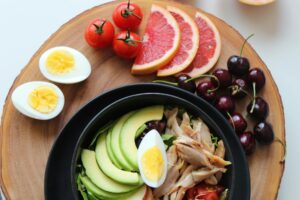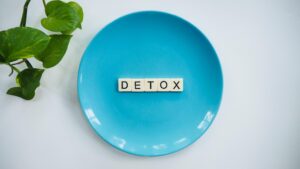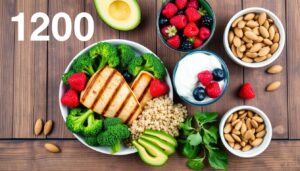Working out at home has never been easier. But the key to success is the right diet. This guide will show you the best diet for home workouts. It will help you get the most out of your exercises.
Whether you want to build muscle, increase energy, or lose weight, the right nutrition is crucial. It can make a big difference in your results.

Key Takeaways
- Understand the essential nutritional needs for effective home workouts
- Discover lean protein sources to support muscle building
- Explore complex carbohydrates for sustained energy
- Incorporate healthy fats for overall health and wellness
- Learn meal planning strategies and portion control tips
What is the Best Diet for Home Workouts?
To get the most out of your home workouts, you need to think about what you eat. Knowing the nutritional needs for effective home workouts is key. A balanced diet is essential to support your fitness goals.
Understanding Nutritional Needs for Effective Home Workouts
Your body needs the right mix of macronutrients (protein, carbs, fats) and micronutrients (vitamins, minerals) for workouts. A balanced diet for home fitness gives your body what it needs to perform well. This includes fuel for exercise, muscle building, and recovery.
The Importance of a Well-Balanced Diet for Home Exercisers
Having a well-balanced diet for at-home exercise is crucial for reaching your fitness goals. Eating nutrient-rich, whole foods helps your body grow muscle, stay energized, and stay healthy. This approach to optimal nutrition for at-home exercise boosts the benefits of your workouts and supports a healthier lifestyle.
| Nutrient | Role in Home Workouts | Food Sources |
|---|---|---|
| Protein | Muscle building and repair | Lean meats, poultry, fish, eggs, dairy, legumes |
| Carbohydrates | Fuel for energy and endurance | Whole grains, fruits, vegetables |
| Healthy Fats | Support overall health and recovery | Nuts, seeds, avocados, olive oil |
| Vitamins and Minerals | Support immune function and metabolism | Fruits, vegetables, leafy greens |
Understanding the home workout nutrition requirements and focusing on a balanced diet can enhance your at-home fitness routines. This way, you can reach your health and wellness goals more effectively.
Lean Protein Sources for Muscle Building
Protein is key for building and repairing muscles. It’s a must-have for the best diet when working out at home. Lean protein sources are especially important for building lean muscle. They help grow muscle and keep your weight healthy, which is great for working out at home.
Here are some top lean protein foods for building muscle at home:
- Chicken Breast: A classic choice, chicken breast is packed with best protein for home workouts and is low in fat, making it an excellent option for those looking to build lean muscle.
- Turkey Breast: Similar to chicken, turkey breast is a lean protein for muscle growth that is versatile and easy to incorporate into a variety of home-cooked meals.
- Lean Beef: While not as lean as poultry, lean cuts of beef, such as sirloin or flank steak, can still provide a significant amount of protein-rich foods for at-home fitness to support muscle-building efforts.
- Fish: Fatty fish like salmon, tuna, and mackerel are rich in lean protein for muscle growth and also provide healthy fats that support overall health.
- Eggs: A staple in any fitness-focused diet, eggs are a versatile best protein for home workouts that can be easily incorporated into a variety of meals and snacks.
- Greek Yogurt: This high-protein dairy option is a great source of lean protein for muscle growth and can be enjoyed on its own or used in recipes.
Adding these lean protein sources to your home workout diet can help you reach your muscle-building goals. It also supports your overall health and fitness.
| Lean Protein Source | Protein Content (per serving) |
|---|---|
| Chicken Breast | 53 grams (4 oz) |
| Turkey Breast | 49 grams (4 oz) |
| Lean Beef (Sirloin) | 42 grams (4 oz) |
| Salmon | 34 grams (4 oz) |
| Eggs | 6 grams (1 large egg) |
| Greek Yogurt | 20 grams (1 cup) |
Complex Carbohydrates for Sustained Energy
Complex carbohydrates are key for fueling your home workouts. They give you a steady energy flow, perfect for intense at-home fitness. Unlike simple sugars, complex carbs are digested slowly. This keeps your muscles fueled for top performance.
Whole Grains and Their Benefits for Home Workouts
Whole grains like brown rice, quinoa, and whole wheat are great for complex carbs. They’re full of fiber, vitamins, and minerals that boost health and exercise. Eating whole grains before working out can make you feel energized and focused.
Fruits and Vegetables: Essential Nutrient-Dense Carb Sources
- Fruits and vegetables are packed with complex carbs and vital nutrients. They add vitamins, minerals, and antioxidants to your workout routine.
- Bananas are a quick carb source for muscles. They also give potassium to prevent cramps and keep fluids balanced.
- Leafy greens like spinach and kale are rich in carbs. They help with muscle recovery and overall health.
Focus on complex carbs from whole grains, fruits, and vegetables for your home workouts. This ensures your body gets the energy it needs to reach your fitness goals.
Healthy Fats for Overall Health
Healthy fats are key for home workouts and fitness. They help your body work right and give you energy. They also help your muscles recover. Adding healthy fats to your diet boosts your workout benefits and helps you reach your fitness goals.
Healthy fats, like those in avocados, nuts, seeds, and fatty fish, are good for your hormones and heart. They make you feel full and happy, helping you stick to your workout plan.
The Benefits of Healthy Fats
- Provide sustained energy for your home workouts
- Support muscle growth and recovery
- Improve brain function and cognitive performance
- Reduce the risk of chronic diseases like heart disease and diabetes
- Promote healthy skin, hair, and nail growth
Top Sources of Healthy Fats for Home Fitness
- Avocados
- Nuts and seeds (e.g., almonds, walnuts, chia seeds, flaxseeds)
- Fatty fish (e.g., salmon, mackerel, sardines)
- Olive oil and extra-virgin olive oil
- Coconut oil
Adding these fats for home fitness to your diet boosts your health. It also makes your workouts better. Remember, healthy fats are crucial for your diet, so eat a variety of them.
| Healthy Fat Source | Key Benefits |
|---|---|
| Avocados | Rich in monounsaturated fats, fiber, and antioxidants to support heart health and muscle recovery |
| Nuts and seeds | Provide a mix of healthy fats, protein, and fiber to fuel your workouts and aid in muscle building |
| Fatty fish | High in omega-3 fatty acids, which reduce inflammation and support brain and heart health |
| Olive oil | Contains monounsaturated fats and antioxidants to promote overall health and wellness |
| Coconut oil | Provides a quick source of energy and medium-chain triglycerides (MCTs) to support metabolism |
By focusing on healthy fats for home workouts, you fuel your body well. It performs better, recovers faster, and stays healthy.
“Healthy fats are not the enemy – they are essential for optimal health and fitness. Embrace them in your home workout diet for better results.”
Best Diet for Home Workouts
A good diet is crucial for the best results from home workouts. By planning your meals and controlling portions, you fuel your body for top performance. This leads to impressive gains. Let’s look at key strategies for meal planning and calorie counting to boost your home fitness journey.
Meal Planning Strategies for Home Workout Success
Effective meal planning is a big help for home workout fans. First, figure out your nutritional needs based on your activity level and health goals. Then, make a weekly meal plan with lean protein, complex carbs, and healthy fats. This supports muscle growth, energy, and overall health.
- Meal prep in advance to ensure you have nutritious options on hand throughout the week
- Experiment with simple, wholesome recipes that are easy to prepare at home
- Prioritize whole, minimally processed foods for maximum nutrient density
Portion Control and Calorie Counting Tips
Mastering portion control and calorie counting also boosts your home workout results. Portion control ensures you get the right nutrients without overeating. Calorie counting helps you understand your energy intake and make diet adjustments.
- Use portion-controlled containers or measuring cups to ensure accurate servings
- Be mindful of your hunger cues and stop eating when you feel satisfied, not full
- Download a calorie-tracking app to monitor your daily intake and adjust as needed
By using these strategies in your home fitness routine, you’ll reach your goals. Fuel your body right, and enjoy a strong, energized, and lean physique.
Hydration: The Key to Optimal Performance
Drinking enough water is key for energy, less fatigue, and good health during home workouts. It greatly improves your exercise and recovery.
Water Intake Guidelines for Home Exercisers
The right amount of water for home exercisers depends on workout length, intensity, climate, and personal needs. Here’s a basic rule:
- Drink 16-24 ounces (2-3 cups) of water 2-3 hours before working out at home.
- Drink 8-16 ounces (1-2 cups) every 15-20 minutes while working out.
- Drink 16-24 ounces (2-3 cups) within 30 minutes after working out.
Remember, these are just starting points. Listen to your body and adjust your water intake, especially if you’re sweating a lot or working out in hot or humid weather.
| Hydration Recommendations for Home Exercisers | Minimum Water Intake | Optimal Water Intake |
|---|---|---|
| Before a Home Workout | 16 ounces (2 cups) | 24 ounces (3 cups) |
| During a Home Workout | 8 ounces (1 cup) every 15-20 minutes | 16 ounces (2 cups) every 15-20 minutes |
| After a Home Workout | 16 ounces (2 cups) | 24 ounces (3 cups) |
Staying hydrated is vital for your performance and health during home workouts. By following these guidelines, you’ll keep your body fueled and ready for your fitness routine.

Pre-Workout Nutrition for Energy Boost
Fueling your body right before working out can give you a big energy boost. It also helps you perform better during your home workouts. Eating foods rich in nutrients can make your workouts more effective and keep you energized.
The best foods to eat before working out at home include:
- Oats – They’re full of complex carbs that give you energy for a long time.
- Bananas – They have potassium, which is important for preventing muscle cramps.
- Greek yogurt – It’s a great source of protein for building and repairing muscles.
- Nut butters – They mix protein, healthy fats, and carbs for a good pre-workout meal.
For pre-workout nutrition, focus on carbs, protein, and fats. This mix gives you energy all through your workout. It also helps with muscle building and recovery.
| Pre-Workout Food | Nutritional Benefits | Why It’s Great for Home Workouts |
|---|---|---|
| Oats | Complex carbs, fiber, B vitamins | Provides sustained energy for your home workout |
| Banana | Potassium, carbs, vitamin B6 | Helps prevent muscle cramps during home exercise |
| Greek Yogurt | Protein, calcium, probiotics | Supports muscle growth and recovery for home fitness |
| Nut Butters | Healthy fats, protein, fiber | Balanced pre-workout fuel for home workouts |
Eating these energy-boosting pre-workout meals can fuel your body for your workouts. This helps you reach your fitness goals.
“Proper pre-workout nutrition is key for maximizing the benefits of your home exercise sessions. Fueling your body with the right nutrients can help you push harder and recover faster.”
Post-Workout Nutrition for Recovery
Proper nutrition after working out is key for your body’s recovery. It helps your muscles repair and boosts energy for the next session. Timing your protein and replenishing carbs and electrolytes is crucial.
Protein Timing and Muscle Repair
Eating a high-quality protein within 30 minutes to an hour after working out starts muscle repair. Lean protein like chicken, fish, eggs, or plant-based options gives your muscles the amino acids they need. This helps them rebuild and grow stronger.
Replenishing Carbohydrates and Electrolytes
It’s also important to replenish your carbohydrate and electrolyte stores after working out. Complex carbohydrates from whole grains, fruits, and vegetables help refuel your glycogen levels. Electrolytes like sodium, potassium, and magnesium are vital for hydration and muscle function.
“Optimal post-workout meals for at-home exercise should include a balance of protein, carbohydrates, and electrolytes to support muscle recovery and overall performance.”
By focusing on post-workout nutrition for home fitness, you can recover better and be ready for your next workout. Adding these strategies to your routine helps with protein and carb replenishment after home workouts. It aids in reaching your fitness goals.

Supplements for Home Workout Enthusiasts
A balanced diet is key, but some supplements can boost your home workout. They help with energy, muscle growth, and recovery. The right ones can change the game for home exercisers.
Here are some top supplements for your home fitness goals:
- Protein Powder – Whey, casein, or plant-based protein powders meet daily protein needs. They support muscle building and repair.
- Creatine – This supplement boosts creatine stores. It enhances high-intensity exercise and muscle growth.
- Pre-Workout Formulas – These formulas have stimulants, amino acids, and more. They give a needed energy boost for home workouts.
| Supplement | Benefits for Home Workouts |
|---|---|
| Omega-3 Fish Oils | Reduce inflammation and support overall health |
| Caffeine | Enhance focus, energy, and fat-burning |
| Branched-Chain Amino Acids (BCAAs) | Promote muscle recovery and reduce fatigue |
Adding supplements to your home workout routine needs a healthcare check. This ensures they fit your needs and goals. The right supplements can take your home fitness to the next level.
Meal Prep Tips for Busy Home Exercisers
Keeping a balanced diet and sticking to a home workout routine can be tough, especially when you’re busy. But, with a few simple meal prep strategies, you can save time and fuel your body right. This helps you stay on track with your fitness goals at home.
Batch cooking proteins like grilled chicken, baked salmon, or roasted turkey is a great idea. Cook these in advance and store them in portions. This makes it easy to make healthy meals all week. Add pre-cut veggies and complex carbs like quinoa or brown rice for a balanced meal.
Another smart move is to use versatile ingredients for different meals. Stock up on eggs, Greek yogurt, leafy greens, and frozen fruits and veggies. These can be used in many dishes, from breakfast to dinner. This method makes meal prep easier and ensures you get the nutrients you need for your workouts.
FAQ
What are the key nutritional considerations for effective home workouts?
For effective home workouts, focus on a balanced diet. Include protein for muscle building, complex carbs for energy, and healthy fats for health and performance.
What are the best lean protein sources for muscle growth during home workouts?
Top lean proteins for home workouts include lean meats, poultry, fish, eggs, and low-fat dairy. Also, legumes and plant-based proteins like tofu and tempeh are great options.
How can complex carbohydrates fuel my home workouts?
Complex carbs like whole grains, fruits, and veggies give steady energy. They’re essential for powering your home fitness routines and support health.
What are the benefits of incorporating healthy fats into my home workout diet?
Healthy fats support hormone production, immune function, and health. They also aid in nutrient absorption and provide energy during workouts.
How can I effectively plan and portion my meals to support my home workout goals?
Plan meals, control portions, and count calories to fuel your workouts. Focus on whole foods and be mindful of portion sizes to reach your fitness goals.
Why is hydration so important for home exercisers?
Hydration is key for energy, body temperature, and health during workouts. Drink enough water before, during, and after exercising at home.
What are some effective pre-workout nutrition strategies for home exercisers?
Eat a mix of carbs, protein, and healthy fats before working out. Good options include whole grain toast with peanut butter, Greek yogurt with berries, or a spinach smoothie with almond milk.
How can post-workout nutrition aid in recovery after home workouts?
Post-workout, eat protein, carbs, and electrolytes to replenish energy and aid in muscle repair. Try a protein shake, oatmeal with fruit, or a chicken and vegetable stir-fry.
What supplements can support my home workout goals?
Supplements like protein powder, creatine, and omega-3 fish oils may help. But, always talk to a healthcare professional before starting any supplements.
How can I effectively meal prep for my home workout routine?
Meal prep saves time and ensures healthy meals for workouts. Cook proteins in batches, prepare snacks, and portion meals for the week.


